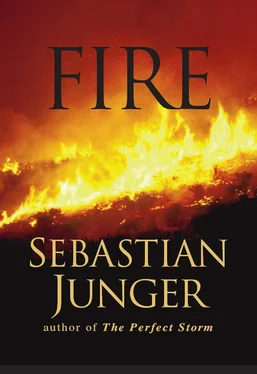The militants, as Childs had thought, had searched down valley when they realized he was gone. They didn’t find him, but they stumbled across two other trekkers, Dirk Hasert of Germany and Hans Christian Ostro of Norway. They were subsequently reported missing and were, in fact, the people the helicopter crew had been searching for. Rebel sources in Srinagar say that Ostro was belligerent toward the militants from the start, telling them that what they were doing was cowardly and un-Islamic; they also claim he was armed with a knife and had tried to use it. That is impossible to verify, but suffice it to say that Ostro succeeded in sticking out in the group.
Childs was brought back to Srinagar in triumph and immediately debriefed in the presence of British and American embassy officials. It was the first of endless debriefings over the next several days. “I spent more time in captivity by the State Department than by the militants,” he said later. Childs was then taken to a secure guest house, where he was introduced to Jane Schelly. For Schelly, the chance to talk to someone who’d seen her husband only hours earlier was a relief beyond words.
“Do they have enough food and drinking water?” she wanted to know. “Do they have enough clothing? Do they know that the women are okay?”
Everything Childs had to say about the hostages was positive: They’d suffered no abuse, and the situation seemed similar to the peacefully resolved kidnappings of a year earlier. The current hostage team—referred to as G-4 because the governments of four Western countries were involved—had no reason to believe that this case would be different. While Indian security kept up a steady dialogue with Al Faran, the G-4 team continued to pressure Pakistan to intervene with HUA. (Pakistani officials were stubbornly claiming that the incident had been staged by India to make them look bad.) A rescue was deemed to be too risky; even Indian Army patrols were warned away from areas where the militants might be. Everyone, including the hostages, was worried that a surprise encounter could erupt into a firefight.
Childs flew back to Delhi two days after his escape, speaking to reporters at the airport despite the efforts of officials to bundle him into an embassy car. A few days later, he stepped off an airplane at Connecticut’s Bradley Field, and news crews taped him sweeping his two young daughters up into his arms. He’d gone from the mountains of Kashmir to Hartford in the space of a week, and it rattled him. “Had circumstances been a little different, I’d be dead,” he says. “You expect to live out your normal life span, but it could be over in a second. At the time I thought I’d never see my kids again. Now every breath I take is something I didn’t expect.”
While Childs was facing the news cameras back home, Jane Schelly was still in Srinagar, working frantically for the release of her husband. “Please let Donald go,” she sobbed at a press conference, holding on to Keith Mangan’s wife, Julie. “In the name of God, please let our loved ones go.” Al Faran responded by passing along a statement that said they had let Childs escape on purpose, but that they would resort to an “extreme step” if India didn’t release the HUA rebels. They also sent a photograph of the five hostages sitting on pine boughs in a stone hut, their hands tied behind their backs, their eyes downcast. On an accompanying tape, Don Hutchings said, “Jane, I want you to know that I am okay. But I do not know whether I will die today or tomorrow. I appeal to the American and Indian governments for help.”
The G-4 team decided, for security’s sake, to move Schelly, the German woman, and the two English women back to the British embassy’s guesthouse in Delhi. Negotiations remained deadlocked, and one week later some very bad news came in: The militants had supposedly run into an Indian Army patrol near Pahalgam, and two hostages had been wounded in the ensuing gunfight. The Indian government denied that the encounter had taken place, so Al Faran released some photos showing Hutchings lying on the floor of a house with his abdomen wrapped in bloody bandages. There was no blood on his pants, though, and he seemed to be refusing to look into the camera—refusing, perhaps, to cooperate with the deception. The consensus at the U.S. embassy was that the photos had been staged, an opinion Schelly shared.
On an audiotape sent with the photos, Hans Christian Ostro asked the Indian government to give in to Al Faran’s demands, pointing out that it was tourist officials in Delhi who had misled him into thinking Kashmir was safe. “I even went to the leader of the tourist office in Srinagar, and he gave me his card and said that if there was anything, I could call him,” Ostro said at the end of the tape. “Well, Mr. Naseer, I’m calling you now.”
Another week passed, and still there was no breakthrough in the negotiations. Britain’s Special Air Squadron and Germany’s elite counterterrorism force, the GSG-9, had by now joined the U.S. Army’s Delta Force in Kashmir, even though an Entebbe type of rescue operation was unlikely; the authorities had no idea where Al Faran was, and there were also delicate sovereignty issues to work out with India. The feeling among the G-4 negotiators was that, as with the previous kidnapping, Al Faran would eventually give in.
They didn’t.
On August 14, 1995, “we were at the German ambassador’s residence, having lunch with the other families,” recalls Schelly. “And during the meal several embassy people were called out of the room, and then more people were called out, and I didn’t think anything of it. The German ambassador was called out just prior to dessert. We were eating cherries jubilee, and the next time I looked over, his ice cream had melted all over the place. And then I began to wonder.”
While the families retired to a sitting room for coffee, a group of embassy officials talked somberly in a corner. Eventually one of them came over and reported that the body of a Caucasian man had been found in the village of Seer, outside Srinagar, but they didn’t know if he was one of the hostages.
In fact, they did know, but they weren’t saying. Cars came to pick up the families, the Ostros’ car arriving first. After they had pulled away, the German ambassador put his arm around Schelly and said, “It’s not your husband.” It was not until that moment that Jane Schelly finally accepted the possibility that she might never see her husband again.
The body was that of Hans Christian Ostro. The guerrillas had cut off his head, carved “Al Faran” in Urdu on his chest, and dumped his body by an irrigation ditch. His head was found forty yards into the underbrush, and a note in his pocket warned that the other hostages would suffer the same fate if the HUA prisoners weren’t released within forty-eight hours. The families of the remaining hostages were told that Ostro’s chest had been carved after he was dead, that he had been “peaceful” when he died, and that he hadn’t been killed in front of the other hostages—though how the officials could know that is unfathomable. However peaceful Ostro’s death, though, he may have known it was coming: Medical examiners found a good-bye note hidden in his underwear.
The G-4 team—now down to G-3—responded by demanding proof that the other hostages still lived. The militants passed along a photograph of the four holding a dated newspaper and also arranged for a radio conversation between Donald Hutchings and the Indian authorities. At ten forty-five on the morning of August 21, a negotiator raised the guerrillas on a military radio, and Hutchings was put on:
“Don Hutchings, this is one-zero-eight. When you are ready, please…tell me ‘One, two, three, four, five.’”
Читать дальше












